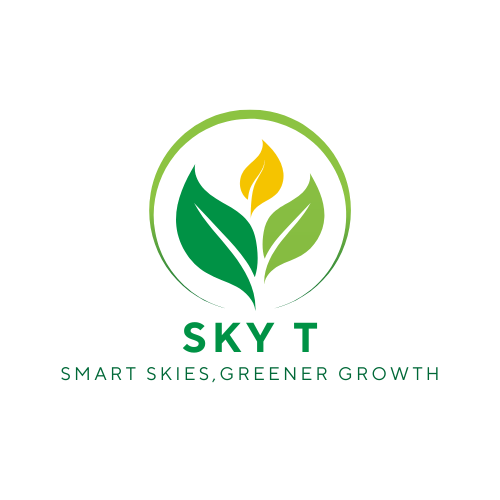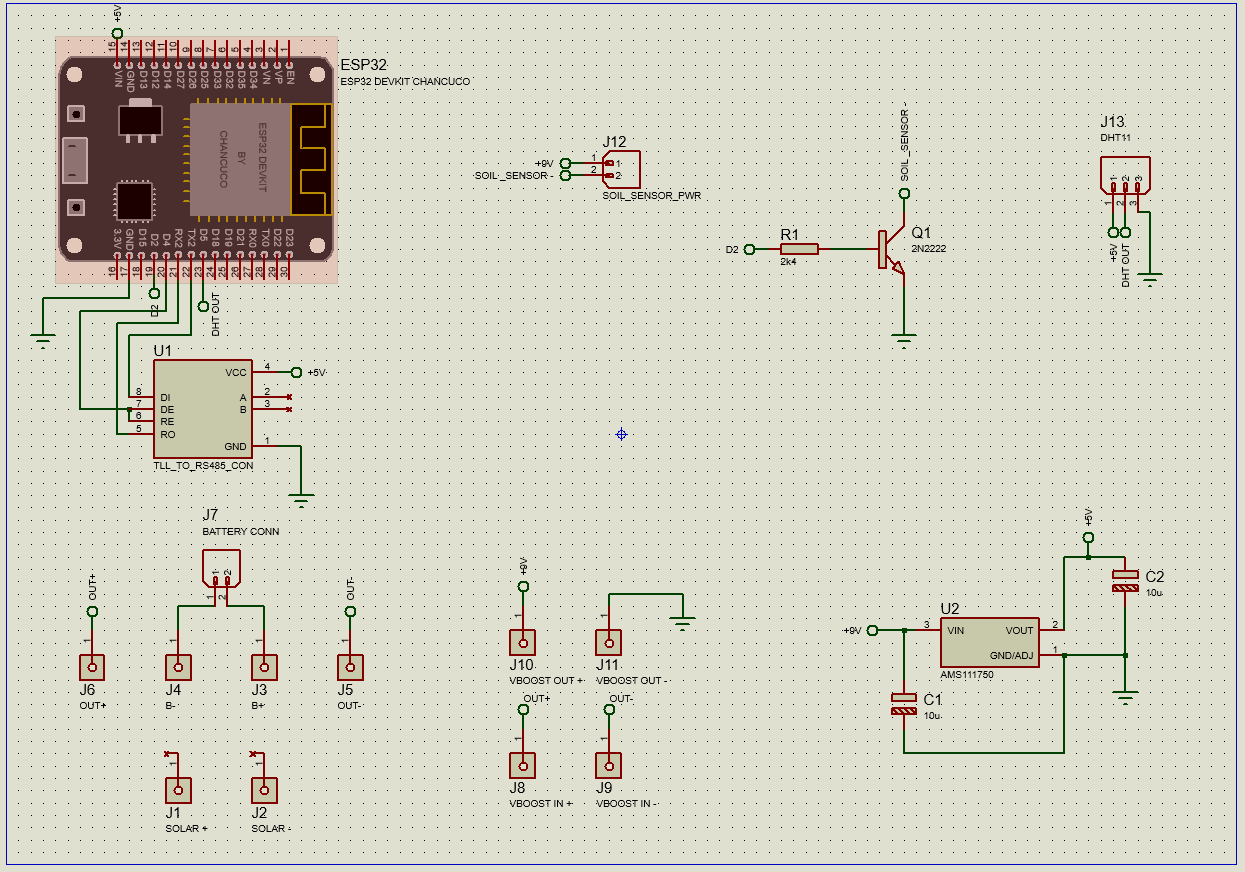
SkyT
Smarter Skies, Greener Growth
A drone based crop management system tailored for Tea Plantations

Sky T
Drone Based Crop Management system
Tea plantation management faces challenges due to inefficient monitoring of vast areas. SkyT addresses this by leveraging drones and IoT devices for sensor data (soil quality, temperature, humidity) and high-resolution imagery, automating data collection and visualization for proactive crop management.
Read MoreIoT Sensors
Deployed across tea estate lots, this ESP32-based sensor unit monitors soil nutrients (NPK, pH) via RS485 sensors, ambient humidity with a DHT11 sensor and effectively sends data to the drone to send to backend. It runs on both solar and battery power and supports BLE activation for easy field configuration and data access.
Automated Drones
A Raspberry Pi-powered autonomous drone captures aerial images of tea estate lots and collects data from IoT sensor units via BLE. It enables remote monitoring and supports intelligent analysis for precision crop management.
Web Dashboard
Built using React.js and Material UI, the dashboard offers role-based access with real-time visualization of sensor data and aerial imagery, enabling efficient monitoring and decision-making for tea estate management.
Cloud Backend
Hosted on AWS for scalability and reliability, the backend architecture features decoupled services: a Flask-based API handles IoT data ingestion, while a TypeScript-powered backend supports the web dashboard. All sensor readings, imagery, and user data are securely managed in a centralized MySQL database, ensuring efficient data access and integration.

Modern Frontend

Robust Backend

Optimized Database

Cloud & DevOps
Authentication & Security
Real-Time & Alerts
Advanced Data
Testing & Docs
Drones Deployed
API Requests Handled
Real-Time Alerts Sent
CI/CD Deployments
Details

User Friendly Responsive Dashboard
The dashboard provides an intuitive, responsive interface tailored for monitoring tea estates, offering clear insights into environmental and sensor data.
- Estates are displayed individually; clicking an estate reveals its subdivided lots.
- Each lot displays its own soil sensor readings, including NPK, pH, and humidity levels.
- Sensor data is periodically logged and visualized through interactive graphs for trend analysis.
- Current temperature readings and time-stamped aerial images of each lot are also available for detailed observation.
- Role-based access control: Managers have elevated permissions to manage estates and schedule drone missions.
- Authorized managers can trigger automated drone flights to capture real-time sensor data and aerial imagery of selected lots.

Autonomous Drone Integration
A lightweight yet powerful drone platform equipped for smart aerial imagery and sensor integration in tea plantations.
- The drone is powered by a Raspberry Pi 4 with an integrated Pi Camera Module for capturing high-resolution aerial imagery.
- It runs the PX4 autopilot stack on ArduPilot with ChibiOS for real-time, reliable flight control and autonomous mission execution.
- Drone communication and control are managed via MAVSDK, enabling seamless coordination with the cloud-based dashboard and ground station.
- The drone collects environmental data mid-flight using Bluetooth Low Energy (BLE) to connect with in-field IoT sensors.
- Captured data includes aerial imagery and real-time sensor metrics like soil temperature and humidity, mapped and stored with accurate timestamps.

Hardware & System Design
Our system features modular and a robust hardware sensor nodes, ensuring reliable sensor integration and environmental monitoring across tea estates.
- ESP32-based sensor node equipped with Modbus RS485 NPK & pH sensors and a DHT11 humidity/temperature sensor.
- Power-efficient design with solar and battery support, activated via Bluetooth Low Energy (BLE) for remote updates.
- Custom-designed ESP32 schematics integrating RS485 soil sensors and DHT11 module for environmental tracking.
- Level shifters and protection circuits ensure safe interfacing with Modbus peripherals.
- Optimized for low-power consumption, remote wake-up, and efficient signal routing.

3D Model & Enclosure Design
Durable and compact enclosures ensure optimal protection and field deployment readiness of both sensor nodes and drone payload modules.
- CAD-modeled enclosures designed for ESP32 sensor units with ports for RS485, BLE antenna, and solar input.
- Custom-designed drone chassis accommodates Pi Camera, Pi 4, BLE antenna, and onboard batteries securely.
- Weather-resistant material used for long-term deployment in varying tea estate environments.
Flight Tests
Manual Stable Flight
Initial stability testing under manual control to ensure responsive handling.
- Manual RC control over short distances
- Good altitude hold and balance checks
- Failsafe landing tested
Featured
Autonomous Stable Flight
Autopilot mode flight with PX4 + ArduPilot to verify GPS path tracking.
- PX4 mission execution tested
- Stable GPS lock and navigation
- Return-to-launch validated
Autonomous Sensor & Imaging
Fully autonomous drone flight collecting BLE sensor data and high-res images.
- Real-time sensor data via BLE
- Pi Camera image capture mapped with GPS
- Data sync with cloud dashboard
Gallery
Team

Chethiya Bandara
E/20/032
Mathisha Bandara
E/20/034
Bimsara Janakantha
E/20/157
Sarani Jayasooriya
E/20/173Detailed Budget
Here’s the complete hardware cost breakdown for the drone-based system implementation.
What is the detailed hardware budget breakdown?
| Item | Qty | Unit Cost (LKR) | Total (LKR) |
|---|---|---|---|
| ESP32 Dev Kit | 2 | 2000 | 4000 |
| RS485 Soil Sensor | 1 | 11000 | 11000 |
| DHT11 Humidity Sensor | 1 | 400 | 400 |
| 3300mAh Li-Po Battery | 2 | 3300 | 6600 |
| Raspberry Pi Zero | 1 | 9290 | 9290 |
| 5MP Pi Camera Module | 1 | 2500 | 2500 |
| 64GB Storage Device | 1 | 1600 | 1600 |
| Buck Converter | 1 | 360 | 360 |
| Boost Converter | 1 | 400 | 400 |
| Solar Panels | 2 | 480 | 960 |
| 3D Printing | 1 | 6200 | 6200 |
| 10CH Receiver | 1 | 6290 | 6290 |
| Miscellaneous | N/A | N/A | 3000 |
| SUB TOTAL | 52600 | ||


Contact
Address
Department of Computer Engineering,
Faculty of Engineering,
University of Peradeniya.
20400
Call Us
+94753729532 / +94702552553
Email Us
e20(032/034/157/173)@eng.pdn.ac.lk









